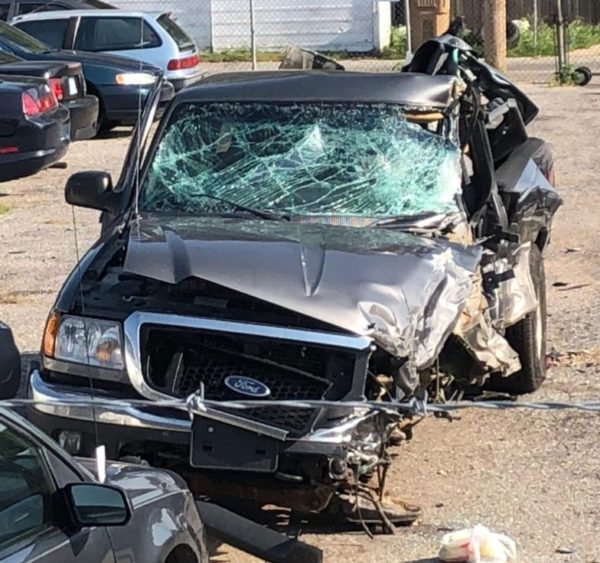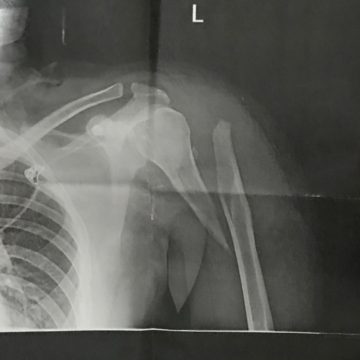Attorney Pablo Mose Relates to Clients After Near-Death Accident and Brain Injury

In August of 2018, I was driving across the state of Kansas in-route to a client hearing. The next thing I recall is being wheeled to the exit of a Kansas hospital 10 days later. I survived a near-death accident, yet my memory of this and the weeks following the crash had vanished.
I was airlifted over 100 miles to a hospital following a crash with a semi-truck. I spent the duration of my hospital stay in the ICU wing, underwent two surgeries to connect a cluster of shattered shoulder bones and reconnect severed tendons in the left hand. I had no memory of what happened, I didn’t recall visits from friends and family at the hospital and no recollection of the surgeries I had undergone. I couldn’t name my hometown and I couldn’t carry on a conversation without quickly forgetting what I was talking about.
What I do remember crystal-clear, was the reason I was driving to Dodge City, Kansas that day. I was going to participate in the first hearing at the firm where I had recently accepted a job. I had previously worked at a national law firm and then opened my own firm working on complex civil lawsuits, but I had not yet found a place that felt like “home.” The stars eventually aligned and a wonderful opportunity to serve the Hispanic community arose while joining a firm full of wonderful lawyers and legal assistants. I remember when I accepted the job, I had a confirming feeling that I had finally found my true home and the type of law firm I had been seeking for years. Ready to jump into a few new cases, I headed to Dodge City.
It’s hard to believe that the next 6 months were fuzzy. I had been shown a picture of my truck on multiple occasions but it wasn’t until the following February that the picture hit home and I was shocked to see the damage that I survived. It was not until this point that I realized what had happened. My lack of memory was the most surprising thing in my recovery. My visible, physical injuries healed within months, but my brain did not return to normal until over a year later.

Pablo Mose Shoulder X-Ray
Medical records would describe my brain injury as simply a “serious concussion.” There are pages of detailed discussion about my visible injuries, such as the spiral break in my left shoulder (that required surgeons to strip the soft muscle tissue from my shoulder bones before installing a metal sleeve to bind the bones back together), the totally severed muscle tendons that had to be reconnected in my left hand, the minor broken bones, and a host of cuts, bruises, and muscle strains.
To this day, I still have distorted scars up my entire left forearm where broken glass from my windows became embedded deep under my skin. While my visible injuries were identified, monitored, and described with excellent detail throughout the medial records, there are only a few lines that list a “serious concussion” as a condition.
I had represented numerous clients in accident cases and my medical records looked strangely similar to many of the clients I have represented who had been injured in accidents. This is not at all to say that medical professionals overlook or fail to treat serious brain injuries. In fact, I believe that I received the best medical treatment in the hospital. But society at large is just beginning to understand the science and significance of brain injuries.
As I was going through this life-changing recovery experience following my accident, I learned four important things about brain injuries:
- Medical science is still developing and constantly changing with brain injuries. There is difficulty in diagnosing and treating brain injuries because the existence of symptoms related to a brain injury are almost always invisible. While a person can see with the naked eye if a cut stops bleeding or a bone has healed, there is no way to look at someone and tell if the symptoms of a brain injury have healed permanently.
- Short-term memory loss can affect your life in devastating ways. Right after a brain injury, there can be complete memory loss and it can take a significant amount of time to see improvement. Even 9 months after my accident, I would find myself having confusion and momentary lapse in my memory.
- An emotional support system can go a long way in helping you recover. Family and friends will see much more of the impact than you will. You may not even know problems exist. Given that the brain, the body’s processing unit is injured, it is very difficult to understand what is happening during your own recovery. You may find your emotions are high and uncontrollable at times. Relying on my family was essential to returning to normal.
- A brain injury impacts your way of life and returning to normal will take time. I recovered from the physical injuries relatively quickly. I was working out again within a month. To people who saw me, I appeared healthy, active, and totally recovered. Yet it was a full year—that’s right, 12 months; 52 weeks; 365 days—before I mentally returned to normal following my brain injury. I suffered what was called a “serious concussion,” yet it still took 4 times longer to recover mentally than physically.
Today, I am back to living a normal life and am recovered both physically and mentally. My experience has further fueled my interest in accident cases and brain-injury lawsuits. I know first-hand how frustrating and difficult it is to recover from a brain injury and I have the utmost compassion for victims and want to fight for people who have suffered similar injuries. From my personal experience and experience representing the injured, here’s the bottom line: Brain injuries of ANY severity are dangerous, serious and recovery takes a long time. If you or a loved one has suffered a traumatic brain injury, please call me today. 620.227.8126